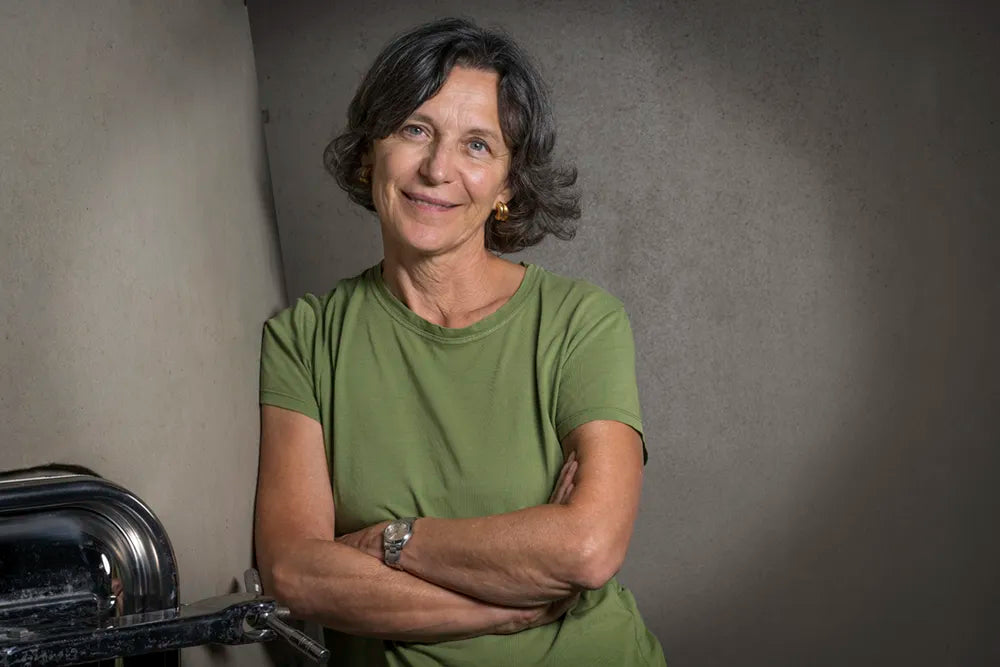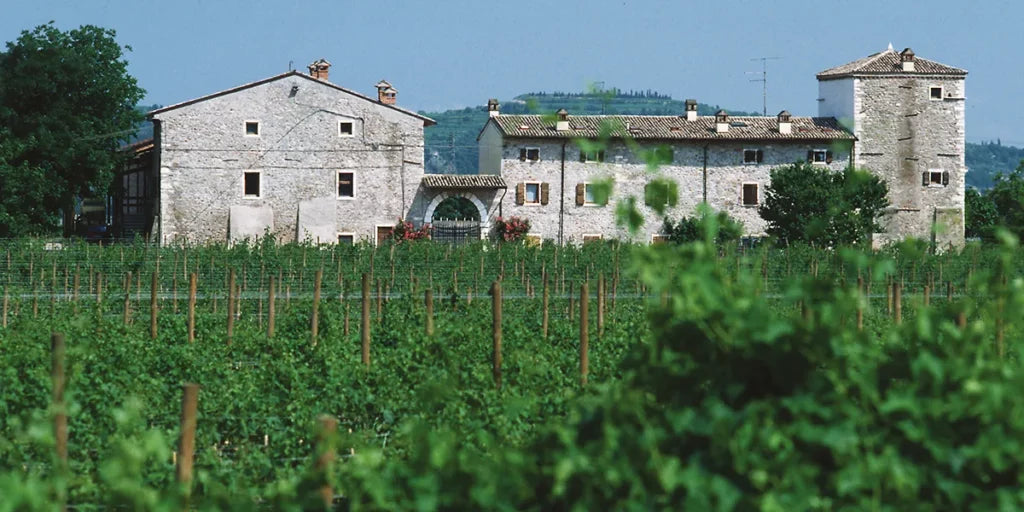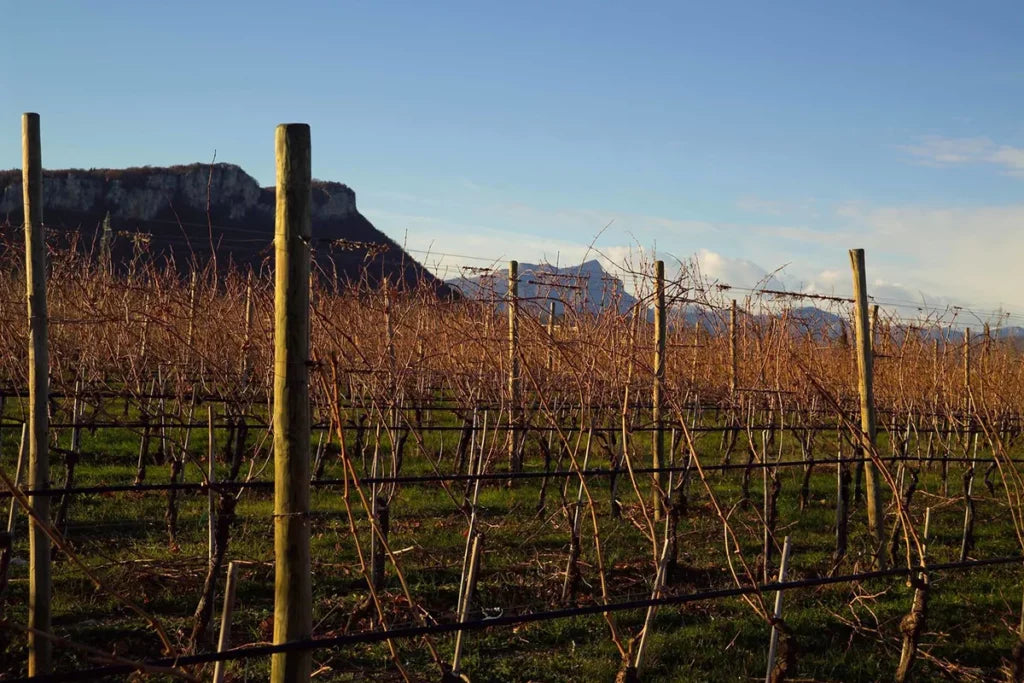ISSIMO x Women in Wine: Matilde Poggi
Le Fraghe owner talks independent winemaking and the importance of respecting the land

Matilde Poggi is the force behind Le Fraghe, and a defining voice in Italian winemaking.
Rooted in the rolling hills of Bardolino, she has been crafting wines with precision, passion, and a deep respect for the land since founding her estate in 1984, quickly making a name as a pioneer of sustainable viticulture in the region. Over the years, she has not only helped shape the identity of Bardolino wines but also championed the role of independent winemakers across Europe, serving as president of both FIVI (Italy’s Federation of Independent Winegrowers) and, up until recently, CEVI (the European Confederation). Her wines are an honest expression of place – elegant, restrained, and full of character – much like Matilde herself.
Keen to know more about her ethos, we reached out to ask her a few questions. Here’s what she told us.
How did your journey into the world of wine begin?
It started when I was a child – really, it’s always been part of my life. I come from a family of farmers, and talk of vines and wine was constant in our home. Some of my clearest memories are of early harvests in October, right after school. I was fascinated by a world so deeply connected to the rhythms of the seasons.
Over time, I felt the desire to get my hands in the vineyard myself and create wines that were truly mine, made with dedication and respect for the land. That’s how Le Fraghe was born. The name comes from the vineyard just in front of the estate – the first I vinified, back in 1984. I’ve never known why it’s called “Le Fraghe” (which means “strawberries” in the local Veronese dialect), but it may be because it’s the only vineyard on the property where wild strawberries grow in abundance.

Over the past 40 years, I’ve made choices, taken risks, made mistakes – and all of it has shaped what is now one of the reference wineries in the Bardolino appellation.
Le Fraghe is synonymous with Bardolino, but also with a natural, sustainable approach. What’s your philosophy when it comes to cultivating the vineyard and making wine?
Everything I do in the vineyard stems from a deep respect for the land and what it naturally offers. I’m very aware that this territory is unique, and my goal is to let that uniqueness shine through in the wines I produce.
Since 2009, we’ve been certified organic – a choice I made because I believe that as farmers, we are the first custodians of the land. It’s a legacy we must preserve and pass on in the best possible condition to future generations. I like to work alongside nature, never forcing it.

Guided by my passion for this landscape, and without a set path in front of me, I’ve always felt free to make wines that follow my own vision. They reflect my personal taste, not passing trends. I’ve never chased what’s fashionable. A vineyard is a long-term commitment, meant to last decades – it can’t follow fads. It has to express the highest quality of that specific place.
What I love most is when my wines express my touch, as well as the unmistakable imprint of our soils and the unique microclimate of Lake Garda and the Valdadige.
Wine tells the story of a place. What do your wines say about your land?
My wines speak of the landscape I love and live in: Monte Baldo rising to the north, the Mediterranean climate of Lake Garda, and the Valdadige valley, where cool northern winds flow down. They tell the story of the Bardolino DOC and of my desire to protect it – through careful, respectful winemaking that aims to enhance it. Every bottle carries a small piece of that story, one I’ve been writing for over 40 harvests.
Which wine best represents you – your signature wine?
That’s a tough question. Each of my wines has its own reason for being, and each expresses something I wanted to say. But if I had to choose one, I’d say Traccia di Rosa – a Chiaretto that breaks all the rules.

It’s one of the few rosés released after extended aging, and it’s a wine that really comes into its own with a few years in the bottle. It’s vinified in cement and then aged for a year on fine lees, also in cement, which gives it incredible elegance and salinity – qualities that come from the vineyard’s glacial moraine soils.
For me, rosé is wine’s “third color,” and it deserves just as much attention as white and red.
In recent years, you’ve become a prominent voice in Italian wine – not just as a producer, but as a figure of influence. What kind of responsibility do you feel in representing women in wine?
I don’t necessarily see myself as representing women in wine, but rather as someone who has represented independent winemakers – both in Italy as president of FIVI and in Europe as president of CEVI.
I still feel like I’m on a journey with my own winery – there’s so much to learn. But I do like to pass on the message that our work is about stewardship: protecting, nurturing, and passing knowledge and land on to the next generation. We have to believe in those who come after us, just as my father believed in me and my siblings, and as I try to do with my daughters.
To young winemakers just starting out, I’d say: follow what you truly love. Listen to the land. Trust your own taste.
Is there a moment in your career that you’re particularly proud of?
Becoming President of CEVI was a very meaningful moment – especially because I was the first Italian winemaker to hold that position. It felt like a real recognition of the work FIVI has done.
I also look back fondly on my time with FIVI and the many winemakers I met along the way. Their advice helped shape who I am. One name that stands out is Costantino Charrère, who welcomed me with warmth and generosity back in 2010. He holds a very special place in my story.
What’s your favourite wine to drink when you're not in the vineyard?
If it’s a wine I don’t make myself, I’d say Schiava from Alto Adige – especially from the Santa Maddalena area. These wines inspire me when I’m vinifying Bardolino. They tell the story of Alto Adige’s small-scale, rural winemaking traditions, and I find that deeply meaningful.
And your favourite food and wine pairing?
I’m proudly Venetian and love baccalà mantecato paired with Bardolino – it might surprise some, since people still expect fish to be served only with white wine. Another pairing I’m loving more and more is pizza and Chiaretto. Verona has so Verona has some excellent pizzerias, and many now offer great wine lists. Try it – you’ll be convinced!
I realise I’ve only mentioned pairings with my own wines, but hey, sometimes a little marketing doesn’t hurt!